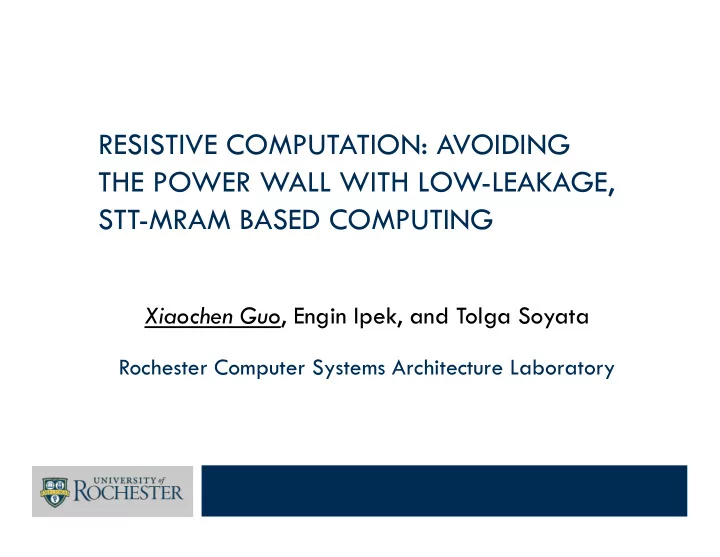

RESISTIVE COMPUTATION: AVOIDING THE POWER WALL WITH LOW-LEAKAGE, STT-MRAM BASED COMPUTING Xiaochen Guo , Engin Ipek, and Tolga Soyata Rochester Computer Systems Architecture Laboratory
Multicore Scaling Limited by Power 2 Traditional MOSFET scaling theory relies on reducing V DD in proportion to device dimensions I leak ∝ e - V th 2x 1.4x P = P dynamic + P static = N (C eff V DD P dynamic = N (C eff V DD 2 f + I leak V DD ) 2 f ) 1.4x 1.4x 2x V DD has scaled very slowly since 90nm Multicore scaling severely challenged by power 6/21/12
Our Approach: Resistive Computation 3 Opportunity: spin-torque transfer magnetoresistive RAM (STT-MRAM) Near-zero leakage power Low-energy read operation Goal: selectively migrate on-chip storage and combinational logic to STT-MRAM to reduce power On-chip storage Caches, TLBs, RF, queues Combinational logic Lookup-table (LUT) based computing 6/21/12
STT-MRAM 4 Desirable properties Access transistor � + � - � - � V write � V read � V write � + � + � - � CMOS compatibility Read speed as fast as SRAM Density comparable to DRAM Unlimited write endurance Value = 0 � Value = 1 � MTJ � Key challenge: expensive writes Long switching latency (6.7ns @ 32nm) High switching energy (0.3pJ/bit @ 32nm) 6/21/12
Switching Time vs. Cell Size 5 Faster switching with L2$, L1I$, LUTs, wider access transistors TLBs, MC Queues + Faster writes - Slower reads RF, L1D$ - Lower density - Higher read energy 6/21/12
Fundamental Building Blocks RAM Arrays and Lookup Tables
STT-MRAM Arrays 7 Problem: low write throughput Multiporting Banking Existing solutions incur high overheads to sustain adequate write throughput in STT-MRAM arrays 6/21/12
STT-MRAM Arrays 8 CMOS subbank buffers Latch in addr/data and release H-tree; complete write locally Allow forwarding from ongoing writes Facilitate local differential writes Reads access subbank via exclusive read port 6/21/12
STT-MRAM LUTs [Suzuki09, Matsunaga08] 9 Store truth tables of logic functions directly in STT-MRAM Benefits Leakage confined to peripheral circuitry Low-power (low-swing) lookups Fast lookups using sense amp Logic functions with many minterms can utilize LUTs effectively 6/21/12
Case Study: 3-bit Adder 10 6/21/12
Pipeline Organization
Hybrid CMT Pipeline 12 Small arrays and simple logic in CMOS Large arrays and complex logic in STT- MRAM 6/21/12
Front End 13 LUT-based carry- select adder to compute PC+4 LUT-based front-end thread selection logic SRAM-based refill queue to avoid I$ conflicts Predecode and back- end thread selection with MRAM-related stall conditions 6/21/12
Register File 14 Architectural registers of all threads aggregated in a unified STT- MRAM array to amortize subbank buffers Registers of a single thread striped across subbanks to reduce subbank buffer conflicts 6/21/12
Floating-Point Unit 15 STT-MRAM CMOS FPU FPU Add, Sub, 24 cycles 12 cycles Mult Div 64 cycles 64 cycles 6/21/12
Memory System 16 Use store buffers to avoid L1 D$ subbank conflicts L1s optimized for fast writes using 30F 2 cells L2 and memory controllers optimized for density using 10F 2 cells 6/21/12
Evaluation
Performance 18 6/21/12
Power 19 6/21/12
Contributions and Findings 20 New technique to reduce leakage and dynamic power in a deep-submicron microprocessor Selectively migrate on-chip storage and combinational logic from CMOS to STT-MRAM Use subbank buffers to alleviate long write latency STT-MRAM is an attractive low-power solution beyond 32nm Dramatically lower leakage power Modest loss in performance 6/21/12
Recommend
More recommend